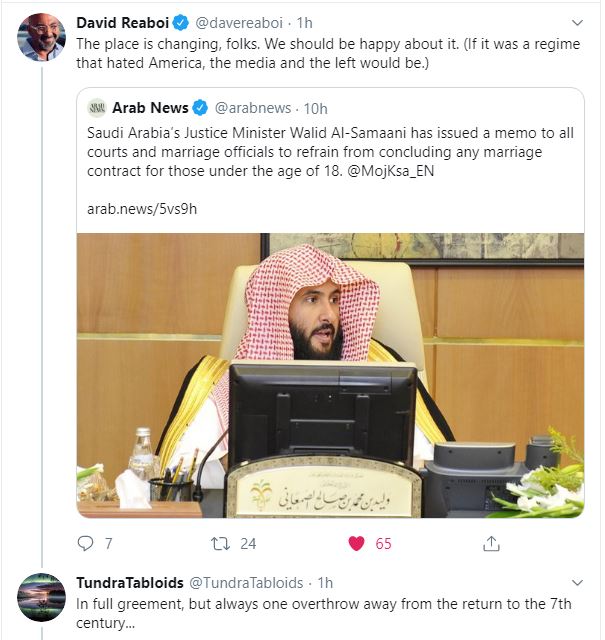I’ve long prided myself on the notion that I’m not an ideologue, that being “blindly partisan advocate or adherent of a particular ideology”. My present-day views on Islam and Arab/Muslim states in the ME have been molded and streamlined through years of study, debate. How I view the subjects just mentioned now, compared to how I viewed them almost 15 years ago, couldn’t be more different. It’s been a long process of weeding out the wheat from the chaff.
What David is proffering here is a challenge to my long-held views. Since Saudi Arabia is the protectorate of Islam and its holy places, and one of the major proliferators of Sunni Islam in the West, it has well earned my distrust and contempt. What Reaboi is seeing in the Kingdom, however, challenges that distrust, and who knows, it might eventually tip the scales in the West’s favor if it really is seeking a less confrontational and subversive role.
Enforcing changes in Saudi society is no easy task, but taking up the challenge to do just that, can’t, nor shouldn’t be simply dismissed as a ploy or a flash-in-the-pan exercise of futility.
I have to admit to being somewhat blinded to that possibility due to what I already come to know, which doesn’t mean I’m no longer skeptical of M.E. change, but it does demand that I take it into consideration and view future observations with a newfound sense of curiosity and no longer gingerly dismiss things that fail to line up with my preconceived notions.
David Reaboi:
No, I think that there is real, significant generational change going on in the region. Even if—heaven forbid—MBS or MBZ were toppled tomorrow, it won’t be what it was. It might be more pro-Iran or China, at the US’ expense, but it won’t be Islamist.
The leadership of these monarchies during and following the Arab Spring was important. While the US and Europe cheered the MB on, these guys made sure their populations knew who was causing trouble.
I’ll make an observation I haven’t yet seen: people in the Gulf will be to leftist Muslims in the west the way Israel is to leftist Jews in the west. It’s already happened, and far more quickly.
I bet there are MB groups right now studying how to take the SJP and IfNotNow anti-Israel model and use it for western Muslims against the monarchies.
TT: Now, this is an excellent observation, I have not seen that in any of the discourse about the region anywhere…
DR: If you recall, this was the MB’s aim even before the monarchies turned anti-Islamist.
It’s a far bigger problem in the west now, exactly. I want to write something about how a lot of our friends (me included) have been absurdly wrong about a lot of these issues in retrospect because we were focused on the wrong thing.
We assumed that the famous “isms” that were the Islamic world’s attempts to deal with the modernity of the 20th Century would culminate in MB’s favorite option, Islamism. But what if real nationalism (deprioritizing religious identity) followed that?
I think it’s obv happening, and that it’s very positive. When UAE banned the MB in 2011, they accused them of sedition—and they were right. They understood their national identity was more important than a shared Islamism. Yet nobody is talking about this, at least in the west.


